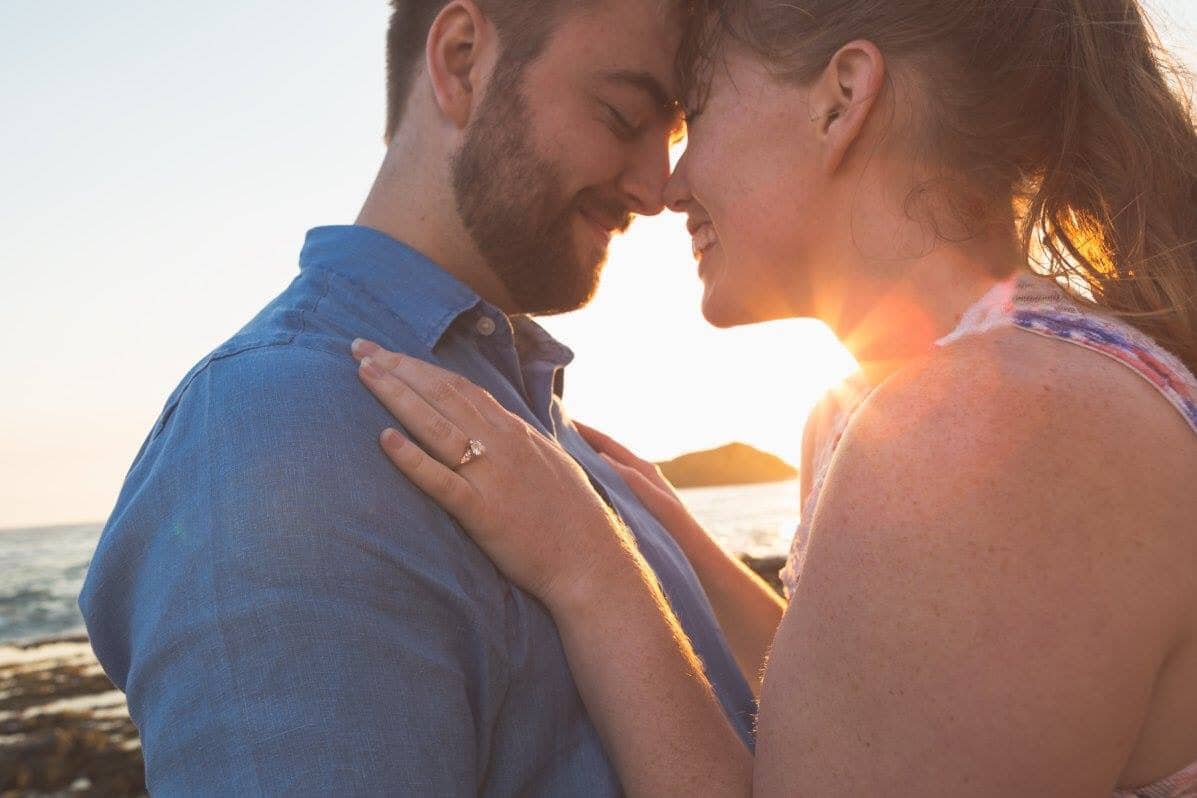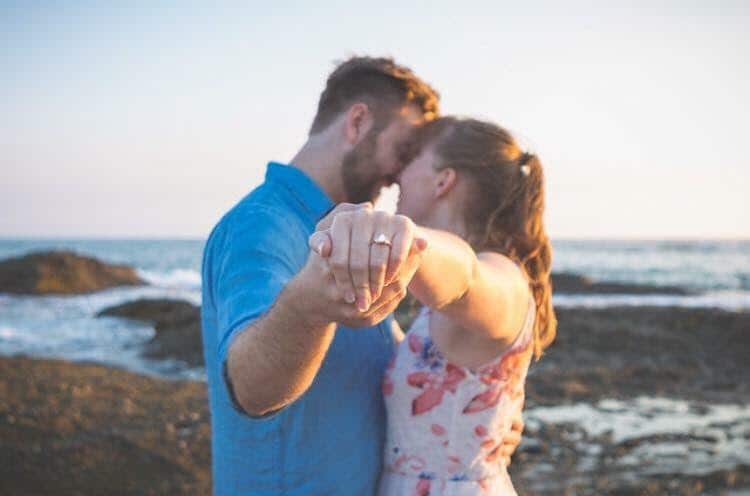“It is astonishing how little one feels alone when one loves.” ~John Bulwer
If there’s one thing we all want, it’s intimacy.
We want to feel deeply connected to other people, fully seen and appreciated by them, and secure in those relationships.
We can have a million and one acquaintances online, but if none of our connections feel intimate and meaningful, we will ultimately feel alone.
There’s actually some interesting research that shows we tend to value physical possessions less when we feel loved and accepted by others, because relationships can provide a sense of comfort, insurance, and protection. They truly are the most valuable things in our lives.
I remember when I completed my last promotional tour. It’s something I used to do for work—travel around the country promoting products at sporting events, concerts, and retail locations. I chose this career partly because it seemed adventurous, and partly because it allowed me to distract myself with constant change and motion.
Although there were more than 20 people on the tour, I frequently stayed in separate hotels because my responsibility was to care for the tour dog, and the group often stayed in places that didn’t allow pets.
I’d just decided to leave NYC shortly before this job, after slowly climbing out of years of self-loathing, depression, and isolation. I wanted nothing more than to make real friendships, but I simply didn’t know how.
I saw it happening all around me. I saw women forming bonds that I knew would last for years, while I frequently felt awkward and insecure. I saw romantic relationships blossoming, while I had a superficial fling with someone I hardly knew, who hardly knew me back.
Though I was trying to open up to people and create space for them to open up as well, I still felt alone, love-deprived, and terrified that these feelings would endure. As a consequence, I frequently sabotaged myself and potential connections.
I assumed there was something wrong with me for struggling in relationships, when it was actually my thinking that manifested everything that felt wrong.
I’m sure there are countless other people who’ve been in that place before: feeling isolated, disconnected, and confused about how to change it.
Others still experience something different but related: They have meaningful friendships, but still feel there’s something lacking—like there could be more love coming their way, romantically or otherwise.
I’ve learned a lot about giving and receiving love over these last several years, and I’ve dramatically transformed my thinking and sense of connection as a result. If you’ve ever wanted to feel more loved, you may find these tips helpful:
Open Your Heart
1. Initiate meaningful conversations.
The first step to feeling more loved is creating close relationships, and that starts with meaningful, engaged conversations. These don’t necessarily need to be deep and spiritual in nature. They just need to be honest, authentic, and reciprocal.
You can initiate this type of exchange with anyone at almost any time simply by asking about the other person, fully listening to what they have to say, and then finding common ground. Naturally some people will stay shut down, but it’s worth the risk of feeling vulnerable to find the ones who won’t.
2. Give the gift of your presence.
Often when we converse with people, we’re not fully listening; we’re formulating our response in our heads and waiting for our turn to talk. We’re not only doing the other person a disservice when we do this; we’re also shortchanging ourselves.
Think about the last time you really opened up to someone. It likely required you to feel a level of comfort and trust, even if you didn’t yet know that person very well. The act of opening up is itself an offering of love. It’s an invitation to let someone in.
In recognizing this and welcoming it by fully hearing other people, we are, in fact, receiving love.
3. Open up your love valve.
Just like a heart valve prevents blood from flowing backwards, our love valve might block the flow of energy in our interactions. This generally happens when we get too caught up in our head, thinking, analyzing, and wanting more, instead of being present and allowing a natural give and take.
Come into the moment, take the pressure off the situation, and avoid the urge to fill silences with chatter. Instead, picture the interaction as something cyclical in nature, where there’s a balance of sharing and listening, giving and receiving.
When we clear the mental clutter and allow this type of flow, we are in essence choosing to be love.
Open Your Mind
4. Change your beliefs about the world and love.
When we tell ourselves the same things over and over again, we end up creating a self-fulfilling prophecy.
If you tell yourself that people don’t care, you’ll put that energy into the world and then easily find evidence to back it up. If you tell yourself you’ll never experience love, you’ll create mental barriers and then subconsciously repel it.
Tell yourself a different story: There’s a lot of love in the world, there’s plenty to go around, you deserve it, and it’s coming to you every day.
5. Consider that love might look different than you visualized it.
In telling yourself that love is coming to you every day, you’re not merely lying to yourself; you’re taking responsibility for recognizing the love around you.
It might not be from the person you want to be with romantically. It might not meet the standards and criteria you defined in your head. That doesn’t mean it isn’t there.
When a friend pushes you to reach your potential, it’s an act of love. When a family member takes the time to listen to you, helping you form insights about your life, it’s an act of love.
See and appreciate the love all around you and it will surely multiply because you’ll come to potential new relationships with a sense of wholeness instead of lack.
6. Give love when you’re tempted to judge.
Ultimately, this is how we all want to be loved: without judgment, pity, or condescension. Commit to giving this kind of love, both in your existing relationships and in new ones you might be tempted to avoid.
That doesn’t mean you shouldn’t follow your instincts when you feel like unsafe around someone. It just means you look below the surface, give people a chance, and in doing so create the potential for more meaningful, mutually supportive relationships.
Make the conscious choice to be understanding and compassionate. While getting isn’t the intention of giving, this will likely set the stage for you to receive the same consideration in return.
Open Your Eyes
7. Value the people who are there.
Sometimes we get so caught up looking for romantic love that we forget to appreciate the friends and family who are always there, offering their support. At least I did. Despite my chronic fear of being seen and judged, and my instinct to self-sabotage, I spent a long time believing that I was incomplete.
I know you might be thinking that friendships aren’t the same as romantic affection, and I understand. I felt this way too. But we don’t attract romantic love into our lives by focusing on what’s missing. We attract potential partners by radiating love.
Take an inventory of all the people who care. There are likely far more than you realize.
8. Recognize the love you’re not giving.
It’s far easier to pinpoint what we’re not getting than it is to be honest with ourselves about what we’re not giving. Perhaps you want people to check in with your more frequently. Are you checking in with them? Maybe you want people to ask more about your personal life. Are you asking them about theirs?
Give the type of love you want to receive. Give praise. Notice the little things. Offer help without it being asked of you.
I’m not suggesting you should always be the one giving. If it feels like a constant one-way street, then it might be time to reevaluate that relationship. But in most healthy ones, giving more freely creates an environment of consideration and generosity.
And then of course there’s the other side of this coin: Ask for what you need! There’s one relationship in my life that’s often felt unbalanced. Recently I asked this friend if she’d call me sometimes just to talk, as opposed to calling for advice. I asked, and now she does.
9. Look deeply at your needs and intentions.
Sometimes when we go out looking for love, we’re really trying to avoid giving ourselves what we need. There’s pain in our past we don’t want to acknowledge; or there’s an emptiness inside that we don’t want to fill on our own.
If you’re feeling a hole somewhere inside, take a close look at what might have caused it. Be strong enough to acknowledge what you need to do for you, whether it’s having a long overdue conversation with a family member, working on your self-esteem, or finding a sense of purpose in life.
We all deserve to feel loved by the people in our lives, but first need to be willing and able to love ourselves. That’s what it takes to feel deeply connected: to feel deeply connected to ourselves and confident in what we can give.
Curated by Erbe
Original Article




